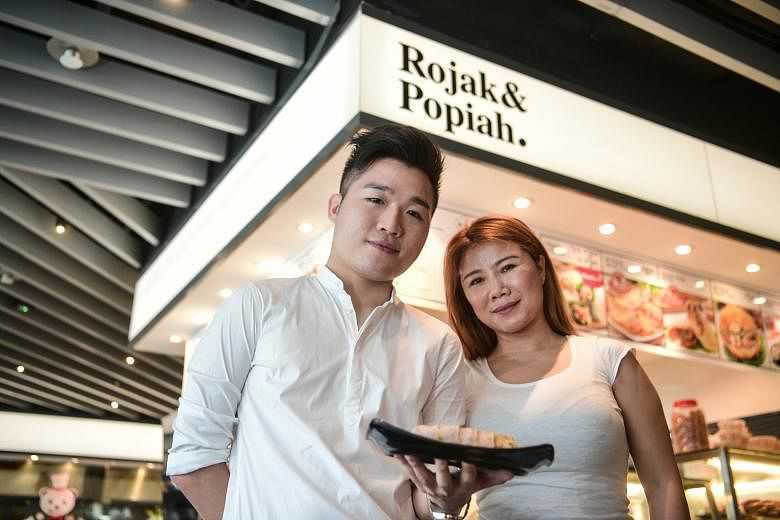When Madam Li Li Hong went to Germany in 2015 for her first international food fair, she unwrapped a mouth-watering business opportunity.
Touring the stalls, the co-founder and managing director of Mr Popiah realised the crepe-like skins could be used for other fare, much like Mexican tacos and Turkish pide.
She says: "Our business had been focused on traditional popiah. We didn't know there were other areas we could enter."
Her son Lewis Tan, 24, also went on the trip to Germany. He had joined the company as its general manager that year. Realising they could adapt their main product, popiah skin, to suit other markets, they began to look at expanding overseas.
He says: "We are now planning a trip to a food fair in Dubai this month, with a sales manager who will be in charge of business development in that region."
Mr Popiah had already ventured into China in 2014 - it ships traditional popiah skins to restaurants in cities such as Shanghai, Xi'an and Xiamen. "But shipping is expensive, and we are restricted to major port cities," says Madam Li, in her 40s. She plans to set up a popiah factory in China by next year.
She started the business with her late husband Tan Kok Hoo about 25 years ago, supplying popiah skins to stalls and restaurants.
The firm now supplies skins and ingredients to more than 70 restaurants and stalls in Singapore, and has three of its own outlets here offering modern fare like sushi popiah and popiah with kimchi and beef.
Mr Popiah's willingness to innovate and expand would get a nod of approval from the Committee on the Future Economy - as would its automation drive. It has 10 vending machines dispensing burritos and popiah - a novel move that mother and son came up with to tackle the manpower crunch.
They are also looking into more fully automating the popiah-making process. Currently, Mr Popiah is 70 per cent automated.
This is especially critical when catering for demand in a market the size of China. A small machine can make 1,200 popiah skins an hour; only about 300 skins can be done by hand in that time. A bigger machine can handle up to 3,000 skins. "But we need to invest in R&D to get the automation process up and running," says Madam Li.
The company aims to achieve automation in Singapore and China by next year. With the increase in scale, it could then embark on business-to-consumer transactions and get its products on store shelves.
"We will also have to focus on our branding efforts," says Mr Tan. "Our company has been around for years, but we are just starting to market ourselves."
What people like Madam Li and Mr Tan want to know from the CFE: How can businesses learn more about overseas markets and enter them? Can they get help with R&D, to speed up automation? Are there opportunities to partner established players to grow abroad?
MR R. DHINAKARAN, managing director, Jay Gee Melwani Group, and a member of the CFE sub-committee for Future Corporate Capabilities and Innovation, says:
Madam Li and Mr Tan's desire to expand their company in this region is admirable and this is something the CFE would like to encourage more SMEs to adopt.
Helping companies scale up and internationalise is a key pillar of the CFE's recommendations. The CFE recommends for trade associations and economic agencies to undertake more study trips in the region. By participating in those trips, they can gain more in-market knowledge that will put the company in good stead for further expansion.
There will also be more targeted assistance to facilitate access to networks, mentors, technology and financing. Through existing platforms, like the Partnerships for Capability Transformation, which matches SMEs to large organisations on collaborative projects, SMEs like Mr Popiah can also learn from established players how to better innovate and internationalise.
IE Singapore, for example, provides both financial and non-financial assistance to Singapore companies looking to expand overseas. The agency leverages its on-ground connections to offer companies insights on key market and sector developments, advises them on set-up and regulations as well as introduces them to in-market partners.
Their Market Readiness Assistance and Global Company Partnership programmes provide comprehensive help across key areas in capability development, manpower development, market access and access to financing. Through these, they work with Singapore companies towards being globally competitive. At the same time, they make sure companies gain the necessary exposure to markets through our workshops, seminars and in-market facilitation.


